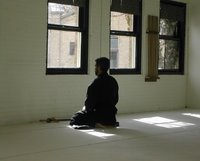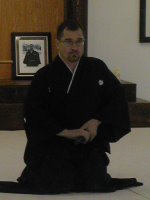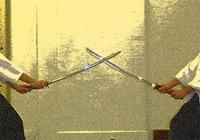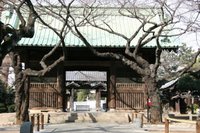 "When you learn to overcome temptation, then the arrow of intellect and the bow of action can manifest as trust in your world. This brings further inquisitiveness. You want to look into every situation and examine it, so that you won't be fooling yourself by relying on belief alone. Instead, you want to make a personal discovery of reality, through your own intelligence and ability. The sense of trust is is that, when you apply your inquisitiveness, when you look into a situation, you knonw that you will get a definite response. If you take steps to accomplish something, that action will have a result-either failure or success. When you shoot your arrow, either it will hit th target or it will miss. Trust is knowing that there will be a message.
"When you learn to overcome temptation, then the arrow of intellect and the bow of action can manifest as trust in your world. This brings further inquisitiveness. You want to look into every situation and examine it, so that you won't be fooling yourself by relying on belief alone. Instead, you want to make a personal discovery of reality, through your own intelligence and ability. The sense of trust is is that, when you apply your inquisitiveness, when you look into a situation, you knonw that you will get a definite response. If you take steps to accomplish something, that action will have a result-either failure or success. When you shoot your arrow, either it will hit th target or it will miss. Trust is knowing that there will be a message.
"When you trust in those messages, the reflections of the phenomenal world, the world begins to seem like a bank, or reservoir, of richness . . . as a warrior, you are willing to take a chance; you are willing to expose yourself to the phenomenal world . . . You begin to realize that you usually fail when action and intellect are undisciplined or unsynchronized, and that you usually succeed when intelligence and action are fully joined."
-- Chogyam Trungpa, Shambhala: The Sacred Path of the Warrior.
I had been looking for a way to explain some of the esoteric personal growth aspects for the advanced iaido practitioner, when I happened on this passage. It captures the key concepts of fearlessness, ceaseless study, and action. When you have read everything written by the Japanese about Zen, pick up one of Trungpa's works. He's not afraid to address many ideas that Westerners regard as mystical or magical, which lie beyond the commonly discussed "internal" aspects of martial arts training.
Nicklaus Suino teaches iaido and other martial arts at seminars throughout North America. Information about his seminars can be found at
www.artofjapaneseswordsmanship.com. He teacher iaido, judo, and jujutsu at the
Japanese Martial Arts Center in
Ann Arbor, Michigan, home of the University of Michigan.
 "A man traveling across a field encountered a tiger. He fled, the tiger after him. Coming to a precipice, he caught hold of the root of a wild vine and swung himself down over the edge. The tiger sniffed at him from above. Trembling, the man looked down to where, far below, another tiger was waiting to eat him. Only the vine sustained him.
"A man traveling across a field encountered a tiger. He fled, the tiger after him. Coming to a precipice, he caught hold of the root of a wild vine and swung himself down over the edge. The tiger sniffed at him from above. Trembling, the man looked down to where, far below, another tiger was waiting to eat him. Only the vine sustained him.






